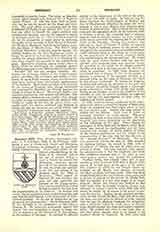

Benedict XIII, POPE (PIETRO FRANCESCO ORSINI), b. February 2, 1649; d. February 23, 1730. Being a son of Ferdinando Orsini and Giovanna Frangipani of Tolpha, he belonged to the archducal family Orsini-Gravina. From early youth he exhibited a decided liking for the Order of St. Dominic, and at the age of sixteen during a visit to Venice he entered the Dominican novitiate against the will of his parents, though he was the eldest son and heir to the title and estates of his childless uncle the Duke of Bracciano. Their appeal to Clement IX was fruitless; the pope not only approved the but even shortened his novitiate by half in order to free him from the importunities of his relatives. As student and novice, the young prince was a model of humility and zeal, and devoted himself to the acquisition of ecclesiastical learning. At the age of twenty-one he was promoted to a professorship. On February 22, 1672, he was elevated to the cardinalate by his relative
Clement X. He protested strenuously against this honor, but was compelled to accept it under the vow of obedience by the General of the Dominicans at the instance of the pope. As cardinal he adhered obeying the command of the general of his order, he allowed himself to be proclaimed pope. In honor of Benedict XI, a member of the Dominican Order, he took the name of Benedict XIV, which he shortly changed to Benedict XIII as Peter de Luna who had previously borne the name (1394-1423) was a schismatic.
His first concern as pope was to enforce rigidly ecclesiastical discipline. He issued several decrees on ecclesiastical dress and was unsparing in his efforts to abolish any semblance of luxury or worldly pomp among the cardinals. During the Jubilee of 1725, he discharged personally the duties of Grand Penitentiary, and is said to have seriously considered the revival of public penances for certain grave offenses. In order to encourage the foundation of diocesan seminaries, he organized a special commission (Congregatio Seminariorum). At a provincial Roman Lateran synod held in 1725, he required an unqualified acceptance of the Bull “Unigenitus” and through his efforts Cardinal de Noailles, Archbishop of Paris, was led to accept it in 1728. During his pontificate Benedict retained the Archbishopric of Benevento which he administered by a vicar-general and which he twice visited (1727, 1729).
In diplomatic matters and in his relations with foreign powers Benedict did not exhibit the vigor and conservatism which marked his administration in religious matters. His love of peace led him to attempt a settlement of the dispute in regard to the ecclesiastical privileges of the Kings of Naples (Monarchia Sicula) by a revocation of the constitution of Clement XI (1715) and by granting to the King of Naples (and Sicily) and his successors the right to appoint a spiritual judge in ecclesiastical affairs, reserving, however, the most important cases to the Holy See. The quarrel with Victor Amadeus of Savoy was compounded by giving to the king the right of patronage over the churches and monasteries in his dominions, without, however, conceding any claim to the incomes from vacant benefices. Towards John V, King of Portugal, the pope exhibited extraordinary firmness in refusing a claim based on the privilege held by other courts to propose candidates for the cardinalate. This was in consequence of the protests made by the cardinals against the elevation of Vincenzo Biechi, Nuncio to Lisbon. In retaliation John recalled all Portuguese residents in Rome, forbade all communication with the Roman Curia, and attempted to prevent the sending of the customary alms from Portugal to Rome; he also interfered with applications for dispensations from matrimonial impediments. At many courts of Europe grave offense was taken by the extension (1728) to the Universal Church of the Office of Gregory VII containing an account of the excommunication and deposition of Henry IV, which to Gallicans and Protestants seemed offensive.
Although full justice can scarcely be done to the virtuous life and the fatherly zeal for the interests of religion of Benedict, his pontificate lost much of its luster because of his misplaced confidence in Cardinal Nicole) Coscia, who had been his coadjutor at Benevento. The pope was ignorant of the peculations and venality of his favorite, whose greed did much to diminish the prestige of the Holy See, and against whom a popular uprising took place on the pope’s death, resulting in a ten years’ imprisonment for this unworthy cardinal. Benedict’s theological writings were published in three volumes (Ravenna, 1728),
PATRICK J. HEALY

